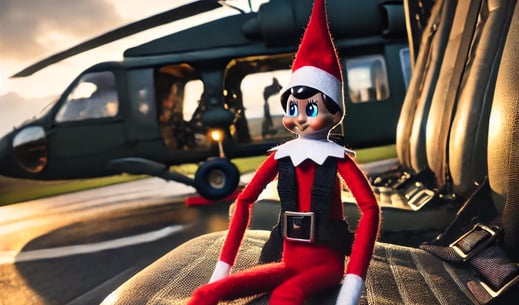
Mission Complete? Not Yet: How Santa Avoids Premature Relaxation
Whether you're flying a Sleigh, a Helicopter, or a Corporate Jet, staying vigilant though every phase of your journey ensures that no mission ends prematurely. So, as Santa proves each Christmas Eve. Focus and teamwork until the very end are keys to success, for gifts and for safe aviation journeys alike.
In aviation, pilots are trained to perform under pressure and manage complex scenarios. However some of the most subtle and dangerous risk don’t always arise during high-stress phases; they can appear after the main objective is achieved. Even Santa Claus, the ultimate holiday aviator knows that the mission isn't over once the presents are delivered.
In aviation, as on Christmas Eve, the real danger lies in if relaxing too soon. Whether you’re flying an EMS mission, completing a corporate flight or wrapping up a training sortie, the temptation to mentally “switch off” after achieving the primary goal can lead to serious safety risks. But as Santa knows, the mission isn’t truly complete until he and his reindeer are safely back at the North Pole.
About Premature Relaxation
Premature relaxation refers to the tendency to mentally disengage or reduce focus after achieving a primary goal or completing the most demanding phase of a task, despite the presence of remaining critical actions of risk. As humans, we naturally relax after completing a demanding mission. In aviation, however, relaxing too early can lead to reduced situational awareness, where critical decisions and observations might be overlooked. Imagine Santa finishing his deliveries and leaning back in the sleigh, thinking the hardest part is behind him a phenomenon that isn’t limited to any specific type of flight. It’s a universal challenge across all type of operations. but for Santa, while most of the effort is spent delivering presents, staying vigilant on the return trip to the North Pole is just as crucial.
Completing a mission objective in challenging environments often creates a false sense of “mission accomplished,” even when flying out of a dangerous area still requires full focus. For example, during an EMS operation, After safely delivering a patient, pilots may unconsciously shift focus away from the flight. The return leg could feel routine, even if weather conditions or operational risks remains.
Why Does This Happen?
The after-mission phenomenon stems from psychological and physiological factors, some of them related to mental fatigue. After high-stakes tasks, the brain seeks relief, reducing focus on ongoing risks. A cognitive bias can produce a sense of accomplishment, overriding awareness of the mission’s remaining phases. When shifting priorities, mental energy diverts to post-mission tasks or upcoming objectives, detracting from the here and now.
Mitigation Strategies
To counteract premature relaxation, pilots can adopt these strategies:
1. Reframe the Mission: Redefine “mission complete” as the moment the crew/passengers and aircraft are safely parked and secured, not when the primary goal is achieved.
2. Set Transition Markers: Build in deliberate steps to refocus after the mission’s primary task. For instance: A “post-objective” checklist to verify the aircraft’s condition, fuel, and route and a quick briefing with the crew to reassess operational risks for the return leg.
3. Foster Team Vigilance: Effective Crew Resource Management (CRM) is key. Encourage open communication, where crew members remind each other to stay alert until the mission is fully complete.
Conclusion
This Christmas, let Santa’s example remind us that the temptation to mentally clock out after a successful mission can lead to critical oversights. The mission isn’t over when the main objective is achieved; it’s over when the aircraft and crew are safely back at base. Whether you’re flying a sleigh, a helicopter, or a corporate jet, staying vigilant through every phase of your journey ensures that no mission ends prematurely. So, as Santa proves each Christmas Eve, focus and teamwork until the very end are the keys to success, for gifts and for safe aviation journeys alike.
By Jeiser Medina
Dec 24, 2024


